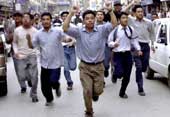|
|
| Saluting a visionary |
The sea turned choppy for the Dravida Munnetra Kazhagam, a key constituent of the Bharatiya Janata Party-led National Democratic Alliance coalition at the Centre, as Murasoli Maran breathed his last. One of Tamil Nadu’s longest serving members of Parliament, Maran was member of both the houses for nearly 35 years and served as Union commerce and industries minister in the BJP government.
In between his prolonged illness, Maran had a brief period of recovery in November 2000, which enabled him to return to normal ministerial work for some time. That phase saw Maran leading India’s delegation to the watershed ministerial conference of the World Trade Organization in November 2001, and even registering his protest against the Prevention of Terrorism Act. But more than a vacuum left in the DMK, what Maran’s death has shown up is another curious twist in the much-debated question of “state autonomy”.
Over the years, several leaders from Tamil Nadu have risen to national prominence — Rajaji, Sathyamurthy, R.K. Shanmugham Chetty, K. Kamaraj, T.T. Krishnamachary, R.Venkatraman, C. Subramaniam being some of them. But they were mostly Congressmen. Besides, in those days of one-party rule at the Centre, coalition politics was unheard of. It was people like Murasoli Maran who made a real difference by representing a regional party like the DMK in the first non-Congress coalition that came to power in New Delhi under V.P. Singh in 1989.
Since then, there have been four Central coalitions, two formed by the United Front and led by the Janata Dal, and two of the NDA variety. Maran — the DMK’s most visible face in the national scene after its founder C.N. Annadurai, and its present leader, M. Karunanidhi — had been minister in three of them. This development added an altogether new political dimension to a regional party that was once feared for its Tamil chauvinism, and was the first to flag off the state autonomy issue in 1969. The question that naturally crops up is, has the power-sharing at the Centre swamped the concern for state autonomy?
For the DMK, its demand for “autonomy” was pegged on its articulation of the concerns and social needs of the Dravidian population as a distinct cultural-linguistic identity. The DMK had inherited this political legacy from the social reformer, Periyar, and the Justice Party. Not surprisingly, one of the first initiatives of the Karunanidhi-led DMK ministry in 1969 was to set up the P.V. Rajamannar committee to study the entire gamut of Centre-state relations. Karunanidhi also made a fervent plea to the then Central government to formulate a scheme to devolve more powers to the states based on the panel’s recommendations.
After the panel submitted its report, the DMK regime constituted another sub-committee comprising, Maran and E. Chezhiyan, both members of Parliament. They crystallized the recommendations of the original committee, sharpened the notion of the “federal principle”. They argued for more powers for the states, going beyond mere decentralization of powers but “without prejudice to the integrity of India as a whole”. This was the first time that a state government in post-independence India had initiated such a “comprehensive and scientific enquiry on the subject”. In the Seventies, Maran himself came to be noticed by political pundits for his detailed work on the subject in Maanila Suyatchi. The Maran-headed sub-committee had made several bold suggestions like doing away with Article 356 , abolishing the office of governor, and having state representation in the management of the Reserve Bank of India to enable more financial autonomy for states. The massive exercise climaxed with the adoption of a resolution in the assembly on state autonomy in 1974.
Much water has flown down the Cauvery since then. Though the DMK continued to hold on to its basic position on state autonomy, hardly anything dramatic happened in the subsequent years, notwithstanding the Centre appointing the Sarkaria commission to study Centre-state relations. Moreover, these issues hardly engaged the DMK’s political successor, the All India Anna Dravida Munnetra Kazhagam, even as the coalition era of the Nineties took away the context of its discussion.
It is against this larger backdrop that Maran’s unique contribution as India’s commerce minister should be seen. At Doha, he secured the developing countries’ interests by successfully stalling any discussion on the so-called “Singapore issues” — negotiations in the areas of investment, competition, trade facilitation and transparency in government procurement. P. Chidambaram pointed to the importance of Maran’s insistence on the replacement of the word “consensus” by “explicit consensus” of the WTO members with regard to the Singapore issues. Maran believed that mere silence could also be construed as consensus. As regards what was required of the developing countries and developed countries in approaching new issues before the WTO, Maran had “changed the words ‘without prejudice’ to ‘without pre-judging’, and the impact of these changes were felt only at Cancun recently,” contended Chidambaram.
This assessment of Maran’s role at the WTO Doha meet, and that too from a Congress leader, came as a vindication of the DMK’s longstanding belief that regional parties could always make a “substantial, constructive difference in strengthening Indian politics”. “Annadurai’s vision of the Dravidian culture and values...making such a constructive impact in shaping national politics has become a reality with the role played by Maran...in ensuring the long-term interests of the developing countries in all future WTO activities,” remarked the DMK’s general secretary, K.Anbazhagan.
Karunanidhi’s comments on Maran after his death were more poignant. Choked with emotion, he announced at the meeting that the “History of the Dravidian Movement”, which Maran had commenced writing, would be completed. That was the DMK chief’s way of saying that the coalition era in national politics has not swallowed the party’s obsession with the subject of state autonomy.











